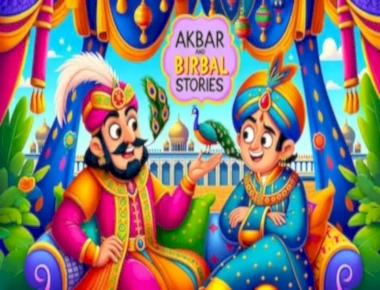Akbar Birbal stories in English
The stories of Akbar and Birbal are indeed timeless and continue to captivate children and adults alike. The relationship between Emperor Akbar and his advisor Birbal is renowned for its blend of wisdom, humor, and moral lessons. Akbar Birbal stories, deeply rooted in Indian culture, have been passed down through generations, often teaching important life lessons in an entertaining and memorable way.
Here are ten of the most famous Akbar-Birbal stories. Each of these stories carries a moral that is as relevant today as it was in the past, teaching virtues like wisdom, patience, intelligence, and the importance of critical thinking. These Akbar Birbal stories make for excellent bedtime stories for children, offering both entertainment and valuable life lessons. They remain a favorite for children around the world.
Akbar-Birbal story: Birbal’s Khichdi
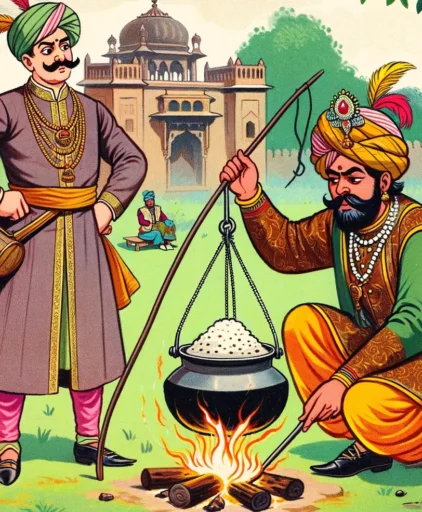
Emperor Akbar questioned Birbal if it was possible for someone to stand in cold water all night for a reward. To prove his point, Birbal found a poor man who agreed to do this, and the man stood in a lake all night.
The next day, when the man asked for his reward, Akbar refused, saying the man had warmed himself by looking at a distant street lamp. Birbal, realizing the injustice, invited Akbar to have khichdi he was cooking. Birbal placed the pot very high above the fire, and the khichdi never cooked. When Akbar questioned this, Birbal pointed out that if a distant lamp could warm a man, a fire far below could cook the khichdi.
Akbar understood his mistake and rewarded the poor man. The story highlights Birbal’s wit and intelligence in teaching the emperor a lesson about fairness and logic.
Akbar-Birbal story: The Three Questions
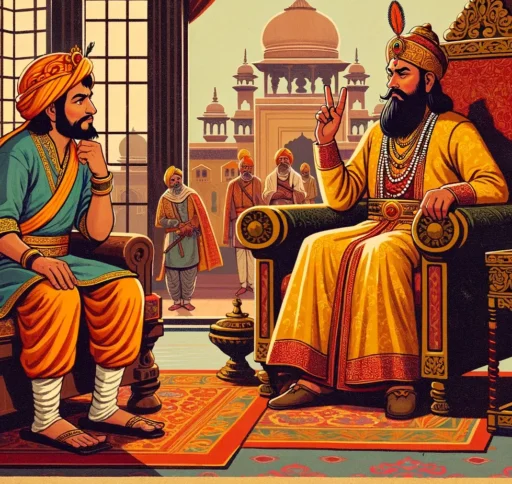
Emperor Akbar posed three questions to his court, offering a reward to anyone who could answer them correctly. The questions were: What is the most important time to do something, who are the most important people, and what is the most important thing to do?
Many scholars and wise men tried to answer, but their answers did not satisfy the emperor. Then, Birbal stepped forward and answered: The most important time is now, the present moment, because it’s the only time we have any control over. The most important person is the one you are with at the moment, for who knows if you will have dealings with any other person in the future. The most important thing to do is to do good for the person you are with, as it’s the purpose of life.
Emperor Akbar was pleased with Birbal’s answers and rewarded him. This story highlights Birbal’s wisdom and the importance of being present, valuing those around us, and doing good in the moment.
Akbar-Birbal story: Birbal Identifies the Thief
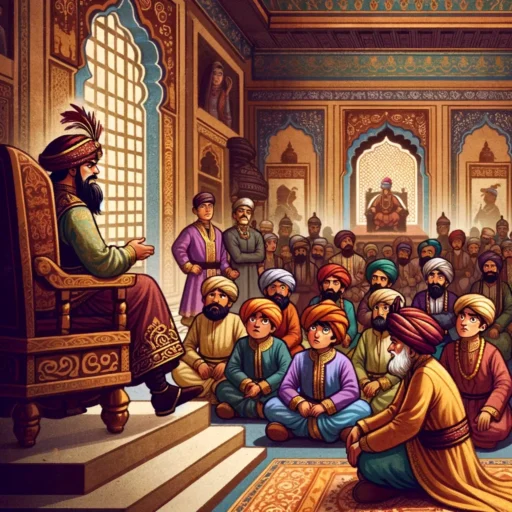
A rich merchant’s house was robbed. The merchant suspected one of his servants and brought them to Emperor Akbar’s court. Akbar asked Birbal to solve the case.
Birbal thought for a moment and then asked for a few sticks to be brought. He gave one stick to each servant and said, “These are magic sticks. By tomorrow, the stick of the thief will grow two inches longer.” The servants were then sent home.
The next day, they were called back to the court. Birbal examined each stick and identified the thief. He explained, “The real thief was worried his stick would grow, so he cut it by two inches to keep it the same length.”
The story showcases Birbal’s cleverness in solving problems and highlights the fact that guilt and fear can often lead to a person’s downfall.
Akbar-Birbal story: Birbal’s Milk Test

Emperor Akbar was curious to know how many honest people were in his kingdom. Birbal proposed a test. He placed a large pot in the center of the town and asked every citizen to pour a glass of milk into it during the night, stating that it would reveal the number of honest people.
Everyone in the town thought that in such a large pot, one glass of water instead of milk would not be noticed. So, everyone poured water instead of milk into the pot.
The next day, when the pot was checked, it was found to be filled with water, not milk. This clever test revealed that no one in the town was completely honest.
The story of Birbal’s milk test teaches a lesson about honesty and integrity, and how individual actions contribute to the collective behavior of a society.
Akbar-Birbal story: Birbal’s Well of Wisdom
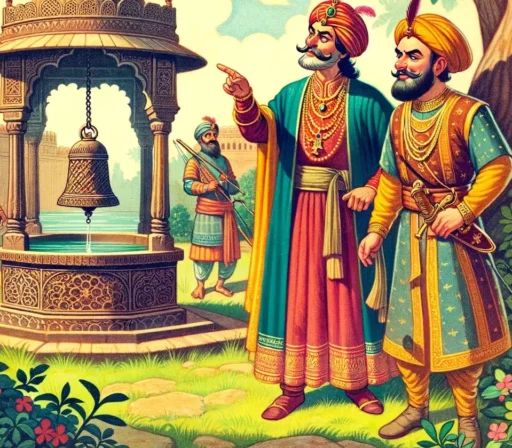
Emperor Akbar was intrigued by the concept of wisdom and asked Birbal where wisdom could be found. Birbal, known for his wit and intelligence, replied that wisdom could be found in a well.
He led Akbar to a well and told him that the well was filled with the wisdom of the world. Akbar, curious, looked into the well but saw nothing. Birbal explained that wisdom was not something one could see or touch, but something that one must seek within oneself.
He further elaborated that wisdom comes from experience, understanding, and learning from one’s surroundings, just as water fills a well from many sources. Akbar was impressed and understood that true wisdom was a matter of insight and perspective.
This story highlights Birbal’s ability to teach profound lessons in a simple yet impactful way, and it emphasizes the idea that wisdom is an internal journey.
Akbar-Birbal story: Birbal’s Sweet Reply
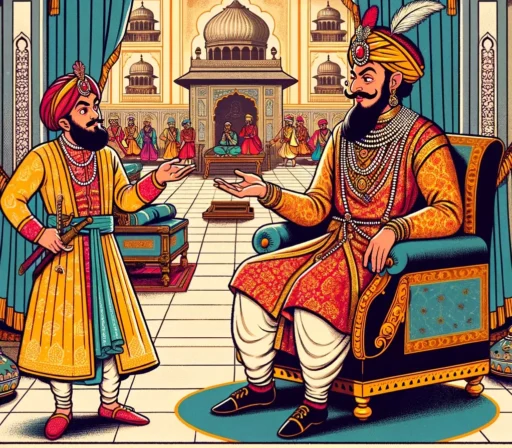
Emperor Akbar, in a playful mood, asked Birbal if he knew of anyone who was a greater fool than the emperor himself. Birbal replied, “Yes, Your Majesty, there is someone.”
Akbar was surprised and asked who it was. Birbal said, “The man who expects a sweet reply to a foolish question is a greater fool.” Akbar realized Birbal’s wit and burst into laughter.
Birbal’s response not only showcased his intelligence and quick thinking but also his ability to handle delicate situations with humor and tact. This story is a classic example of Birbal’s unique way of addressing complex situations and his ability to provide thought-provoking and amusing responses.
Akbar-Birbal story: Birbal’s Journey to Heaven
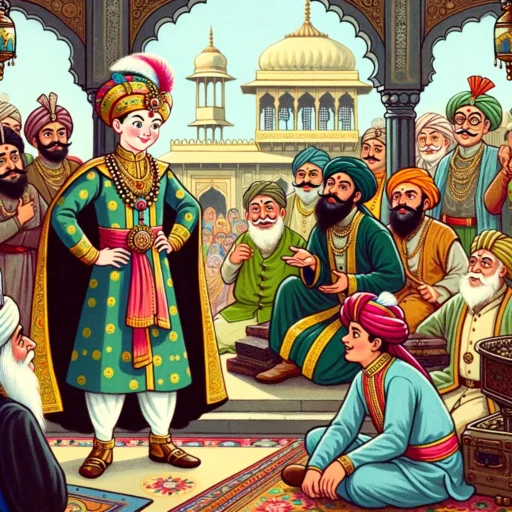
Birbal decided to teach a greedy priest a lesson. The priest had claimed that he could travel to heaven and bring back gifts for others, for a fee. Emperor Akbar was intrigued and asked Birbal about it. Birbal said he would go to heaven himself and asked for a large sum of money to prepare for his journey.
On the appointed day, Birbal sat on a pyre and asked to be set on fire, claiming it was the only way to go to heaven. The greedy priest, who was present, got scared and admitted that he was lying about his ability to visit heaven.
Birbal’s clever plan not only exposed the priest’s lie but also saved many people from being cheated. This story is a classic example of Birbal’s wit and intelligence in dealing with deceitful people.
Akbar-Birbal story: Counting the Crows in Delhi
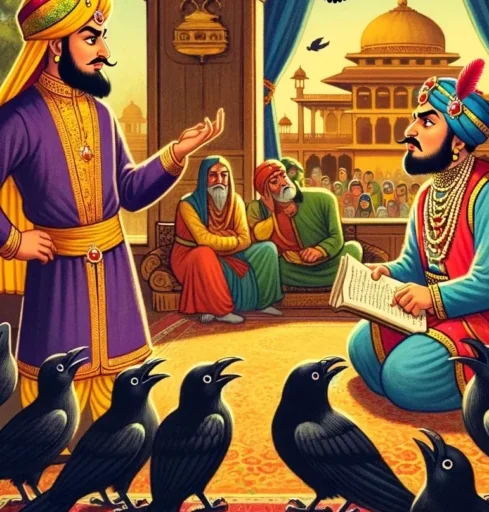
Emperor Akbar challenged Birbal to count the number of crows in Delhi. Birbal accepted the challenge and after a few days, he came back with an answer.
He told Akbar, “There are nine thousand, nine hundred and eighty-seven crows in Delhi. If there are more crows, it means they are visiting from nearby areas. If there are fewer, then some of them have gone to visit other places.”
Akbar was amazed by Birbal’s response and realized the impossibility of counting the exact number of crows. This story is an example of Birbal’s cleverness in finding witty solutions to seemingly impossible tasks, showcasing his intelligence and diplomatic skills.
Akbar-Birbal story: The Stick of Wisdom
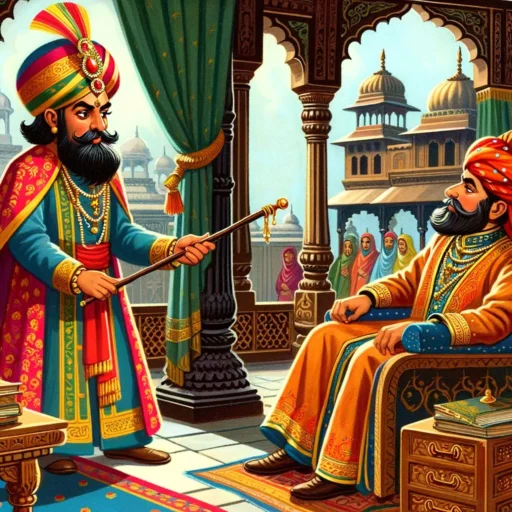
Emperor Akbar asked Birbal to find the biggest fool in the kingdom and bring him a stick, to be known as the ‘Stick of Wisdom’. Birbal accepted the task.
After many days, Birbal entered Akbar’s court with a stick. Akbar, curious, asked whom the stick was for. Birbal replied, “This stick is for the biggest fool in the kingdom. I found him today. When I was leaving my house, I met a man who was about to set sail on a long journey. He asked me to take care of his home until he returns. But he did not know when he would come back or even if he would come back at all. So, I give this stick to you, Emperor, as no one knows when you will go on a journey or if you will return, yet you still entrust your kingdom in the hands of others without a second thought.”
Akbar realized that Birbal was referring to him and laughed at his own folly. The story showcases Birbal’s clever way of teaching important lessons in a humorous and indirect manner.
Akbar-Birbal story: The List of Fools
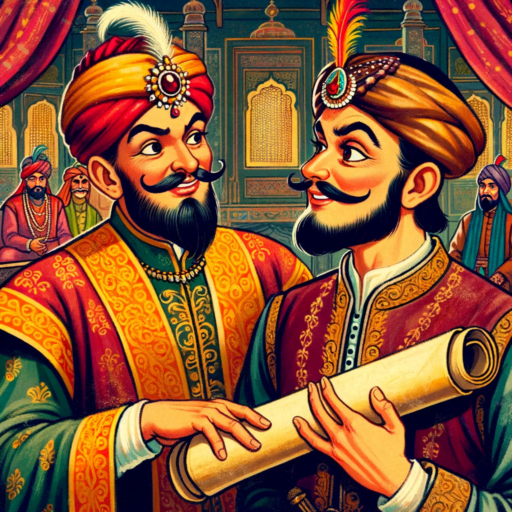
Emperor Akbar asked Birbal to make a list of all the fools in the kingdom. Birbal agreed and after a few days, presented a list to Akbar. The emperor was surprised to find that the first name on the list was Birbal’s own.
When Akbar asked why he had put his own name on the list, Birbal replied, “Because only a fool would agree to such an impossible task as making a list of all the fools in the kingdom.” Akbar laughed and appreciated Birbal’s wit and honesty.
This story highlights Birbal’s cleverness and his ability to handle even the most challenging requests from the emperor with humor and wisdom. It also reflects the importance of self-awareness and the ability to laugh at oneself.

Exploring our Akbar-Birbal stories in English, rich in moral and cultural content, is an excellent way for young readers to enhance their language skills and learn about good values. We have a diverse collection of these short stories in English, and we’re constantly updating it with more. Remember to revisit us for new Akbar-Birbal stories, filled with wisdom and humor. Also, we’d love to hear about your favorite Akbar-Birbal stories! Share them with us at info@kidspep.com, and they might be featured in our upcoming updates!
